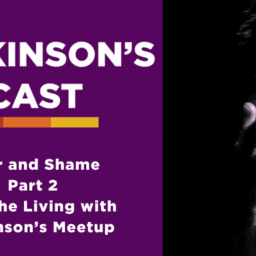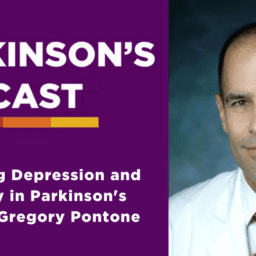Parkinson’s can affect nearly every system in your body and may touch nearly every aspect of your life. So, it’s no surprise that understanding sex and gender differences and how they impact Parkinson’s is an important consideration for living well.
In this webinar, panelists Kat Hill, Karen Jaffe, Soania Mathur, and Nabila Dahodwala discuss:
- Hormonal life stages and Parkinson’s (including premenstrual, pregnancy, and pre-or post-menopausal)
- Hormone therapies (particularly estrogen and progesterone) and Parkinson’s
- Motor and non-motor symptoms in women with Parkinson’s
- Psychosocial and mental health issues in women with Parkinson’s
- Relationships and social roles for women with Parkinson’s
- Care team considerations and communication
Watch the recording below.
You can read the transcript below or download it click here.
Jenna Deidel:
My name is Jenna Deidel and I am our Director of Community Engagement here at the Foundation. And I am joined by four really incredible women today to kick off well we’re actually doing a bit of a mini-series on this really important and tricky topic sometimes of sex and gender differences and their impact on people living with Parkinson’s. And so today on international women’s day, we are taking a moment to really dig into information that will be hopefully relevant to people who are women who were assigned female at birth. And we will continue the series later into the next couple of months and will cover more deeply into issues that affect men and also people who are trans and non-binary. So, you can visit our website to find out more information about those upcoming pieces of the series.
But we have a lot to cover today. We actually have collected tons and tons of questions from our community over time that we’re hoping to cover as much ground as we can. And please do as I said add your questions in the chat. We’re hoping we’ll have a few minutes to tackle some additional audience questions today, too, but if we don’t get to do that, this is just the first of hopefully many in this series where we’ll dig into a lot of different dimensions of this issue. So even if we don’t get to them today, please put those questions in the chat and we will come back to them at some point. So, I am going to now take a moment to let each of our panelists introduce themselves briefly. You can read their full bios on our website and I encourage you to do so cause these are some really impressive people that we have here. But I thought today each person could share a bit of their background and sort of what has brought them to this particular or panel today. So, I think we have some really interesting backgrounds here. So actually Kat, if you wouldn’t mind kicking us off and sharing a bit about yourself and then we’ll kind of round robin to everybody so we can know who is joining us here today.
Kat Hill:
All right. Hi, thank you for such a lovely welcome. My name is Kat Hill. I’m from Portland, Oregon. And I come to this topic both as a woman with Parkinson’s disease that was diagnosed in her forties and also as a former nurse practitioner and midwife who practiced in a big inner- city hospital in Portland. So, women’s healthcare has always been a passion for me. And I think it’s a complex issue and I’m excited to be part of this esteemed panel. Thank you.
Jenna Deidel:
Thanks so much, Kat.
Kat Hill:
You can, you can toss it.
Jenna Deidel:
I will. I’ll go ahead and toss it. Thank you though. Soania, will you kick us off next?
Soania Mathur:
Thank you, Jenna. So, my name is Soania Mathur. I’m a family physician and also someone who was diagnosed with young onset Parkinson’s disease in my late 20s. I went through three pregnancies during this time. I come to this from the perspective of wanting to know more because I think, you know, hearing about the complaints from our community, from women and the unmet needs that they seem to have caused me to do more research into the subject and kind of realized that there was a lot we didn’t know. And that’s why I think it’s really important to explore how we can optimize quality of life for our female patients with Parkinson’s.
Jenna Deidel:
Thanks, Soania. Karen.
Karen Jaffe:
Thanks Jenna. Well, I, like Kat and Soania come at this with a medical background. I’m a retired OB/GYN. I was diagnosed with Parkinson’s disease at about age 46. Although I didn’t get really started until 47 cause I didn’t believe the first guy. That poor person, that poor first neurologist who nobody ever believes in. And so, you know, I’ve been retired for several years now, but have spent my life taking care of women. And that brings me to this panel in hopes that we can kind of answer some of the questions or at least get some discussions regarding what people would like to know about and how we can find that information for them.
Jenna Deidel:
Wonderful. And last but not least Nabila.
Nabila Dahodwala:
Hi, welcome everyone. I am Nabila Dahodwala. I am a neurologist and a movement disorder specialist in Philadelphia, Pennsylvania, and I am very excited to be part of this lovely panel. And I think I bring to this, I have a very strong interest in understanding disparities in care, group differences based on race, ethnicity, sex, and gender, and what we can do to improve equity and care and provide high value care for all people of Parkinson’s disease, including and especially women.
Jenna Deidel:
Thank you. Awesome. So, I’m sure from those introductions everyone who’s listening today can see why we’ve put together this group of people to talk about this topic, both bringing such a myriad of perspectives to the table, not only lived experience, but also a wide range of medical
experience here. So that’s really what our focus will be today and we’ll cover as much ground as we can. Really quickly before we dive in. I think it’s always really helpful for us to learn a little bit about all of you who are also listening. So, we have just a couple of very quick polls just so that we can start to learn more about you. So, the first one is we’d love to learn a little bit more about your relationship to Parkinson’s. So, we’ll give a couple of minutes here for people to select their answers. It’s always fun to watch these happen in real time on our side, we are looking like we have primarily people living with Parkinson’s who have tuned in with us today. Let me just give this another 10 seconds or so to let folks weigh in.
Great, and yes feel free to add into the chat other dimensions about your relationship with Parkinson’s. I will share those results so everyone can see who’s joined us here today. Take a couple seconds to look at that 92% people living with Parkinson’s and then one more poll, just to give us a little bit more of a sense of where we’re all coming from when it comes to today’s topic. So, in this one, how much do you know about the impact of sex and gender on your experience with Parkinson’s? So, this may be one of the first times you’ve thought much about it. You may have thought about it, but you’re actually not quite sure how they relate. You might be actually aware of some of the ways, or you might be aware of many of the ways that your sex and or gender has an impact on your Parkinson’s.
Or you might be an expert. I think one of the things that may prove to be true from our based on our previous discussions with this panel is I’m not sure any of us are quite experts and that’s not necessarily our fault. I think there’s a lot of reasons for that. So go ahead and end this poll and share results. So, it looks like a lot of us have thought about it a little bit maybe, but aren’t, don’t really know how it’s connected. Some of us might be a little bit more familiar and some of us are kind of actually may have not even known that this is an issue to even consider. So, I think that gives us a really wonderful starting jumping off point here. So, you know, actually related to this, I think one of the main outcomes we are hoping to have from this discussion is that everyone here watching would kind of walk away and be validated that actually some of the things they’re experiencing is actually this impact of sex and gender on Parkinson’s and some of the nuances, the symptoms and things like that.
Those are real and they’re worth, you know, talking about. So, I’d love to hear actually Soania, if you don’t mind starting us off, if you can share a little bit more about what are we talking about when we’re saying, you know, what kind of symptoms or experiences or, you know, that women might be experiencing with Parkinson’s that are often overlooked or dismissed, what have you seen there that you’re really hoping people can walk away with, like no, no, that’s real, that’s something you should pay attention to.
Soania Mathur:
Thanks for that, Jenna. I think, I mean, we have to start off acknowledging that Parkinson’s for each individual is unique in some way, in terms of presentations, symptoms, ways you respond to medications, your prognosis, the sort of trajectory of your disease. And this also holds true for different groups of people. So, we know that Parkinson’s disease, although it is more common in men does affect women as well but differently so. And if you look at how women experience it, there are actually, you know, studies that have shown that women do differ in terms of their symptoms. In terms of motor symptoms, we tend to be more tremor dominant. We tend to have more facial masking. We tend to have more restless leg syndrome, which drives our partners crazy. We also tend to have more dyskinesias from use of levodopa.
Good news is we seem to have less disease progression if that’s, that is a bonus and the non- motor symptoms tend to affect women to a very significant degree compared to our male counterparts, especially when it comes to mood and sleep disturbances, so anxiety and depression, we’re talking about, we’re talking about fatigue and apathy, your genital symptoms and more women complain of pain. We tend to have less cognitive impairment and hallucinations and delusions and that sort of thing. Which is I guess a good thing, but one of the major areas that I think impacts our non-motor and motor symptoms are the psychosocial issues that we as women face and women do have more psychological distress. If you question them about their health related quality of life, it tends to be lower than for men that negative stress sort of self-identity crisis tends to happen more for women. And all of these combined, sort of lead to women being taking longer to be diagnosed and less likely to be referred for evaluation by a movement disorder specialist. So, I mean, I think it’s all very impactful on the way women are managed as well.
Jenna Deidel:
That’s a lot Soania. And I, you know, I think we will dig into several of the things that you mentioned, I think in a little more detail and depth as we continue on in our conversation. But I remember again, kind of back to this big, this stage setting that we’re doing right here when we were discussing as a team before this webinar, Kat, you were talking bit about sort of what you think some of the influences are. So, Soania just described a lot of very real symptoms that are different for women living with Parkinson’s and you also reflected that it’s not always taken that seriously. So, what is some, like, where do you think that’s coming from? Why is that happening?
Kat Hill:
Well, I think it’s multilayered and I don’t think it’s unique just to women with Parkinson’s. I think it’s unique to women in general and I think there’s lots of reasons for it. I think that historically women are taught to when they get their menstrual cycle power on just get through it don’t think too much about it, live life, go about your normal day and not have a lot of focus on that, which I’m not judging. I don’t think that’s a bad thing necessarily. However, when it comes to chronic illness or illness in general, it’s really possible that hormonal fluctuations both in menstruation and also menopause or perimenopause can really impact the way that diseases are managed. And I think Parkinson’s is one of those. I think that we’ve heard a lot from our sisters out there, those that have Parkinson’s that the week before their period and the week of their period, things are really impacted.
And I know for me personally, that has certainly been the case. I was perimenopausal when I was diagnosed with Parkinson’s, in fact, I was just sure that it was menopause and certainly nothing else that was making me feel off. And I think mood disorder wise, too. I think that women are sometimes written off a little bit because, oh, it’s their time of the month, both by themselves and providers. And I think as providers we need increased awareness. I think we’ve learned that our movement disorder specialists aren’t typically bringing it up, where we are in our cycles. Are we still menstruating? Are we perimenopausal? Are we having hormonal, are we on HRT? Are we taking medicines to help us manage some of those symptoms, and are those things impacting the way we’re treating our Parkinson’s disease? So, that’s kind of a broad answer to the question.
I think that there’s some real opportunity for growth for this population, for us to be bringing it up to our providers, to be paying attention, to be tracking our symptoms. Do we notice things being different, often people will track their cycles, but are they also how their medicines work around their cycles or their irregular cycles or is it worse or better when they’re on their HRT? So, we’ve gotta bring it up as patients and I wanna ask any clinicians here to please bring it up in your exam rooms. You know, our bodies and our reproductive health is an integral part of our health as women. And please ask us about it. It’s not a scary topic. I promise. You’ll get better at it as you bring it up.
Jenna Deidel:
Practice makes perfect, huh? I mean, I have to say, I think while it can be shocking, you know, when you sit down and you hear you read the new paper that’s been circulating about unmet needs of women, it’s very shocking to see kind of the disparities laid out like that. And also, as you know, a woman not living with Parkinson’s, it’s not particularly surprising is as you said, I think there are a lot of influences, both kind of internalized and cultural and social that can kind of set up some of those barriers that really get in our way of advocating for ourselves and communicating properly and even validating within ourselves much less maybe seeking validation externally. And that was another topic that we discussed in our preparation that we really wanted to make sure we covered today. So, this idea of how do we kind of communicate what’s, how do we track what’s going on, communicate about it and really get someone to hear, you know, hear us. So actually, Karen, I would love to hear you know, some of your tips, your tactics, how do you approach doing this? How do we do that practice makes perfect? What could we do to get better at communicating what’s going on with us and advocating for ourselves?
Karen Jaffe:
Well, it’s such a great question, but let me just start by saying, you know, it doesn’t help that we have a picture that was drawn in 1879 of an old man shuffling as what represents us, this Parkinson’s patient. And granted he may have Parkinson’s disease, but he’s not representing what most of us with Parkinson’s disease, even men, have. And so, this acknowledgement by, you know, if you look, if you Google Parkinson’s disease you’ll see multiple iterations of that picture, if you Google MS, there’s not one picture that shows anybody with the disease, so it’s, we’ve gotta start there. We’ve gotta really kind of reeducate physicians in the healthcare community that Parkinson’s, you know, the motor symptoms are just the tip of the iceberg. You know, what’s below those, what’s below is so many, you know, symptoms that for women they get written off is just being, oh, they’re women, you know, they’re told to go to do yoga or just stress reduce whatever, when what they actually have is Parkinson’s disease.
But once somebody is diagnosed with Parkinson’s disease, I think that it’s you know, people are nervous around physicians. They go in there and they tend to be more passive. So, one of the easiest things I think people can do is when you go in, be prepared and be prepared to say, you know, I have a few things that I’d like to talk to you about. Can you please leave time at this appointment to address them? And if you do that up front, then it’s a much easier way for the physician to manage their time versus, you know, their hand is on the door, they’re leaving. You say, Hey, wait a minute. I wanted to ask you a question. How does this, you know, jive with my menopausal symptoms? And they’re gonna be, you know, Ugh, do they walk back in the room and do they sit down when they’ve got a schedule to keep?
Unfortunately, I think that we are a long way off of having the information that people would need, because we don’t have any great studies that are looking at women’s issues. When you look at the number of women who in the United States who’ve been pregnant with Parkinson’s, it’s not that many, Soania’s a, you know, the fact that she’s had three pregnancies is really remarkable. So, and you know, half of people who are with Parkinson’s disease, who are pregnant, get worse, the other half don’t, we don’t know why that is, but that’s what the statistics would show. So, I think that being aware that there are some questions that you’re gonna have about women’s health issues that your neurologist may not be able to deal with. It’s a really great opportunity to invite your gynecologist and your movement disorder specialist to coordinate some of the efforts so that maybe you’ll spark an interest in one of them to kind of, sort of start cataloging and looking at people’s symptoms. But it’s kind of, sort of up to us to bring this up to them and to ask and to challenge them, to think beyond, you know, their little narrow medical field.
Jenna Deidel:
Yeah. And it sounded too from kind of Soania’s stage setting of touching on the many different, you know, myriad aspects and symptoms that, you know, might be different for one woman living with Parkinson’s, it sounds like it’s not necessarily just limited to sort of, you know, reproductive conversation and connecting with our gynecologist, but also considering, you know, that broad spectrum and moving through. And we just shared in our chat here, a number of worksheets that we, you know, share with folks to help them prepare for those conversations.
Karen Jaffe:
And I also think that, you know, we can reach out to the Fox Foundation because Fox Insight is a perfect tool for us to use, to gather large numbers of patients who’ve already connected to them and to create questions and surveys that would really give us you know, a jumpstart into how different women are dealing with it. As Soania said we’re all different. But there’s obviously similarities between us. And so, to try to figure out which ones of those are important and what kind of impact they have on the entire population of Parkinson’s patients, I think is something we could utilize. So.
Soania Mathur:
That’s such upcoming actually, Karen.
Karen Jaffe: Oh, good.
Soania Mathur:
Yeah, we’re working with them to develop a really comprehensive survey of women with Parkinson’s disease.
Karen Jaffe:
I think that’ll go a long way into answering a lot of the questions into trying to figure out which things are important and which things maybe aren’t so important.
Kat Hill:
And I think that, I just like, to tag onto that, if you see a survey for women, it would help us all of you out there to take a few minutes and fill it out. I know sometimes they’re cumbersome or they don’t come at the right time, but getting that information and that data is really vital to how we help move forward in treatments and in awareness. So, hopefully that’ll be out, we’re getting close, huh Soania?
Jenna Deidel:
That’s awesome. I mean, absolutely, you all bring up advocacy happens on so many levels. It’s this sort of, you know, self-advocating that we’re talking about, advocating to others, which then hopefully broadens awareness with our providers, advocating within our, you know, medical education and then participating in those important, you know research studies and surveys that our experiences can be counted. So, I think there’s a lot of ways to kind of tackle this in a big picture sense. Nabila, I would love to kind of, you know, kind of continue on this for a second about how to make the most of our time, especially with our, our MDS, which can feel, it can be infrequent, it’s often short. What are some ways that you, as a provider, see people succeed or that you help people along to make sure that they’re succeeding at advocating in your office.
Nabila Dahodwala:
Sure. And I wanna just reinforce what everyone has already said, cause I completely agree. I especially like what Karen said about coming in with some topics that you wanna discuss ahead of time. So, preparing for your visit, writing it down will help you not get nervous or forget. And you know, if your doctor does, is not giving you time to ask you your own questions, I would maybe say that’s not a good fit for you. I mean, I personally in my practice, that’s the first thing I ask, like, what are the questions you wanna get through today before I go through anything on my end? I will say like, as you probably know, you know, we have appointment slots, so we can’t spend, you know, all day with you as much as we would love to. So, trying to keep it focused on one or two most important things.
So, thinking about what the priority be for what you wanna get through, and then if there’s more things, it doesn’t mean we will never get to it. It might mean you need another appointment sooner. It might mean that we draw in other people from the care team to help us, whether it’s one of our nurses or social workers or mental health providers, depending on what the other issues we didn’t have time for is the other thing I have found actually very helpful in my practice. And I don’t know if all doctors would agree, but I really like it cause I like to know what’s going on in your life. And I like all the information, but I don’t always have time in the visit. So, I have some patients who will send me a message ahead of time through like the electronic portal that goes through, these are the things I wanna talk about when I see you next Monday.
And then it just like prepares me, gives me a heads up, and I have all the details there. And then during the visit we can, it’s much more efficient. We can kind of go through what the plan is. Not everyone, you know, not every doctor might read that or have the time for it, but it does, it does allow you to think through your thoughts, write it down and have it there as a resource. And then if your doctor didn’t read it ahead of time or didn’t have time, at least they can go back to it when they’re thinking about what’s the best plan. I had some other thoughts. Oh, I think in between visits you can also communicate with your doctor. And I think the most helpful thing in those times is, I personally like the electronic messages more than the phone calls, but I think being very clear and specific.
So in between visits, I would ask a question. So, sometimes I’ll get messages where people like tell me what’s happening and then I’m not sure what they want from me. Like, do they want, I can validate what’s happening or, but is there a specific question that you want me to answer? Otherwise, it might be something I’ll say, well, we can talk about this at your next visit. So, I think being a specific and clear as possible, and sometimes you might not know what the question is and that’s totally fine. And you can say that like this is happening. I’m not sure if I need to worry about it or not, or, but that already is a question. So, you know, we’re available for support and it, and sometimes even though we have limited time, there’s other ways to get ahold of us. I think that’s mostly, there’s probably more, but those are the things that came up that I thought of first.
Jenna Deidel:
That’s great. Thank you, Nabila. And I think as an extension of that, when Karen, you know, was sharing some of the thoughts, sort of the idea of our care teams and sort of who was on our care teams, how they’re connecting and communicating, maybe also on our behalf, you know, came up and I saw that you nodded with that. So, I’m curious you know, within this context of you know, making sure that we’re improving the care for women living with Parkinson’s, you know, I think we think of our Parkinson’s care team, kind of who all should really be considered part of our Parkinson’s care team? Who needs to know what’s going on with our Parkinson’s and vice versa? And how can we make sure that people like our gynecologist or endocrinologist or folks like that, if those should be, you know, in that circle can be looped in, if they’re not Parkinson’s experts, do you have any thoughts about how that does work, could work, aspirationally should work, wherever we’re sort of at in the process there.
Nabila Dahodwala:
I would say aspirationally involving the obstetrician gynecologist is really important. I don’t think it’s something we typically do. I think it’s probably very uncommon. I think this, sessions like this and the paper that came out really are shining a spotlight on the fact that we’re not, we haven’t been traditionally recognizing that there are hormonal changes that women go through through their lifetime that impact Parkinson’s symptoms and that coordinating with women’s health experts is really important. So, I think just starting that conversation with your neurologist and your gynecologist about, you know, how can we connect, I think to help facilitate that type of multidisciplinary care, if you’re seeing doctors within the same health system, that tends to help because we have shared health records, so we can see what the other person is doing. If they’re, you know, if you see someone at an academic center for maybe your Parkinson’s and you see your local gynecologist, then they’re gonna have to communicate by letters and phone calls, which is, you know, sometimes not as effective.
So, if you can see everyone in the same health system that’ll help the communication. I think the other thing that helps is going to centers that already do multidisciplinary care. So, a lot of Parkinson’s centers will have physical therapists that can do things like pelvic floor therapy for women, occupational therapists, social workers, psychiatrists, they may have nutritionists, they’ll have already a multidisciplinary team. And I think adding to that team as needed based on whatever symptoms or problems you’re having will be a lot easier when you’re already at a center that believes in that type of care.
Karen Jaffe:
Jenna, one of the other things to think about is it’s a little bit, it’s a different take on this, but is if you see any research studies that are involving women or looking at women’s issues is to participate in them because they have a lot more time and a research team really takes care of their research clients and really gives them a lot in return for their help in the study. So, if you see any studies that are basic female studies, or maybe related to one of your own symptoms, like urge incontinence or something like that, you know, to participate.
Jenna Deidel:
That’s a great, it’s another dimension of advocacy really. That’s a great suggestion, Karen. Kat or Soania, anything to add to kind of this, you know, approach to this interdisciplinary team and how we can educate back and forth with our providers, any other insights to add?
Soania Mathur:
I mean, I agree with whatever has been said so far in terms of you know, making up your interdisciplinary team. I think that like the disease is unique for us, our team is gonna be unique for each and every one of us. But I do think that right now, women are approached more in silos so that, you know, your hormones are managed by one physician, your Parkinson’s is managed by another and there isn’t that cross communication. And that’s where you as a patient also have to play a role in terms of being that quarterback of your team that will help everyone to communicate so that your care is optimized. Because approaching it just based on, you know, one narrow focus is not gonna work, it’s multidisciplinary care that works best.
Kat Hill:
Yeah. Soania, I was gonna echo that, you’re the captain of your own ship and you are the only consistent player in all of these offices. And so, taking your story with you. I also think having a succinct story with specific questions, having been clinician and having almost the time in the visit, hey, I saw my OB/GYN or my midwife, and she put me on this hormone patch. What I’m noticing is my medicines aren’t working as well. And putting some time aside before you go into your movement disorder specialist for you to think of as yourself as a whole person, you aren’t just silos, right. You’re not just your pelvic floor and then your uterus and then your movement disorder. Right? So, think about it and be specific. And I think that will help you navigate your appointments. And if you have a caregiver that can help you do that, also, your caregiver or and advocate that you take with you can also be the consistent thread in keeping that story together. If it’s, we all get nervous, I get nervous at my appointments. I feel like I know what I’m supposed to do. And then sometimes I can do it. And sometimes I can’t. So, I always write down on a piece of paper and my husband comes with me. So.
Jenna Deidel:
Yeah, that’s a great, I was thinking as you were speaking Kat, as also wearing many hats and being a, excuse me, an ambassador for our foundation. I wondered too, you know, I think I saw some folks in the chat who have mentioned that they’ve started, or they are participating in a support group, you know, women’s support group. Those could be good places, maybe find someone who’s willing to practice your story with you, or even come with you if it’s appropriate and you know, we have many ambassadors and other folks like that. So, whether it’s a spouse or partner, but there may also be, you know, other, you know, friends and people who can help kind of boost your confidence, be your cheerleader, and maybe even help remind, you know, and fight right alongside you for that, keeping your voice loud and clear.
Nabila Dahodwala:
I would a hundred percent so echo that having someone else in the visit with you is so helpful for the whole team. I think it gives you another set of ears to listen to what’s happening, sometimes like us as doctors, tend to spit out a lot of information. And you know, if you’ve talked to them ahead of time about what your concerns are, they can help advocate for you and nudge you to bring up topics that maybe you might feel shy about or are not sure it’s appropriate for the setting. And I think it can only be helpful. And then you end up building up more of a support team around you and a support network.
Jenna Deidel:
Yeah. We all, hopefully if we’re really lucky we have that friend or that partner in our life, who’s willing to be like, weren’t you saying something the other day about, and even when we had maybe decided to brush that under the rug will help gently tease that out and make sure that it’s more prioritized. So, if you can find someone like that in your corner, that’s always great. Okay. So, thank you all for that. I think that sets a really, you know, that’s maybe more than half the battle in many ways, right? Is everything we’ve talked about, about validating yourself and communicating and creating, you know, communication between your team members and things like that. But we also wanted to spend some time today trying to get into kind of a little bit more, some maybe somewhat rapid fire looking at since we only have 60 minutes today.
But to dig into some more specifics about some of the symptoms and some of the interactions of different elements of our body with our movement disorder. So, the first kind of big chunk that we wanna talk about, which we truly could talk about probably for hours and hours and hours, and can use much more research about is hormones and hormonal life stages as they relate to Parkinson’s. Just a little small topic that we’ll try to dig into. There actually is a really wonderful webinar that both Kat and Karen were on last year that covered some of this. So, we’ll drop that in the chat, because I think that may be an additional piece that people today may want to check out. But we’re gonna do our best shot to dig into some of the questions that we hear most often and see if we can, you know, shed a little bit of light on some of them. So, these are kind of open to whoever wants to jump in on them. And our first one is really, we’ve touched on it just a little bit, actually in some of this introductory information, but what do we know about how menstrual cycles affect symptoms and the effectiveness of medications? And I will say what we know and what research knows, a little different, but if we can shed a little bit of light on that and I’ll leave the floor open to whoever would wanna try to tackle that to start.
Kat Hill: Yeah, go, go.
Nabila Dahodwala:
Okay. So right. We don’t know a lot in terms of research. I think a lot of the research so far has looked at risk for Parkinson’s disease. So, you may notice if you’re at like a big patient group, that there tends to be more men with Parkinson’s disease than women. And there is research that’s still not perfect, but that suggests that women have an overall lower risk of Parkinson’s disease than men. And that is maybe in part related to lifetime exposure to sex hormones, particularly estrogen. And so, if you kind of take that forward to that, once you have Parkinson’s disease, there has been some research, not always super consistent with the findings, but that the degree of sex hormone exposure with Parkinson’s disease can affect your symptoms as well. So, if you can imagine during your menstrual cycle, your hormones will go up and then down, especially when you’re at your period or right before your period, when you’re pregnant, the hormones will get a lot higher and change.
So maybe Soania can speak more to how she felt during it. There’s really not a lot of literature on women with Parkinson’s disease when they’re pregnant. And then when you are kind of perimenopausal and postmenopausal, the levels of your estrogen go very low. And so, at each stage, it can affect how you’re feeling obviously, but can affect your Parkinson’s symptoms specifically. And I think in terms of this science, what we know is that estrogen might have some pro-dopaminergic effects. So, when the estrogen levels drop, probably right when you’re having your period, I don’t know Karen, you can get me correct me if I’m getting this, the hormone levels wrong during menstruation, but you might feel worse then before and during your period.
Karen Jaffe:
But we go back to the whole thing of that, you know, we don’t have a lot of the big studies. And so, it’s really hard because just as Parkinson’s is, you know, different for everybody, so are people’s periods and their, how they deal with their menstrual cycles, how they deal with pregnancy hormones, how they deal with postmenopausal things. So, you know, it’s in some ways hormone things are treated like Parkinson’s disease and that is we deal with symptoms. And because we don’t have anything that, you know, we have things that cure menstrual cycles it’s called, you know, postmenopausal or hysterectomy, but, you know, we don’t really have any things that are beyond symptoms, we’re, every month, people are gonna have a period until they stop having a period. And so, they just have to kind of figure out what they wanna deal with.
But there is some studies to show that, as Nabila said, that estrogen is probably beneficial, that it probably changes the way, but we have to remember that it might change the way Parkinson’s meds get metabolized. But the good news is, is that it appears that in some of the Alzheimer’s studies that there’s an improvement in cognition with, in women they have less progression, cognitive impairment than men, and that’s probably attributed to, you know, 17 beta estradiol. So, there’s, I don’t know that we’re ever gonna figure all this out because it takes so many people. It’s gonna take so many people to get these answers in a thing that is so different for everybody.
Kat Hill:
Yeah. And on that note, you know, I think though that if we can start having the dialogues with our movement disorder specialists and say, hey, I don’t think my meds are working the week before my period. I consistently have more symptoms. So maybe there are some ways for us to treat women the week before their cycle or the week during their cycle. And, and I know some movement disorder specialists are doing that just like they do if those of us that had a lot of peri menstrual mood disorder stuff, right that started, that predated our Parkinson’s diagnosis, treating that piece patient by patient it’s the individualized patient care. I think we can advocate for that, whether or not we’re able to get enough numbers in our studies, at least initially.
Karen Jaffe:
And it may be a little bit of guesswork on the movement disorder specialist part, but that’s okay. I mean, our medications aren’t, you know, aren’t particularly dangerous. And I think there’s a lot of leeway in our medications so that we really could try to tailor if you had your movement disorder specialist was interested in doing so, working with you in trying to tailor your medication regimen around your symptoms, just to see if it’s, you know, if it’s better or worse.
Jenna Deidel:
And I’m curious, and Nabila already brought this up, but Sonia you know, in thinking about many different, you know, hormonal experiences in life stages, as someone might go through pregnancy as we’ve said is we have even less kind of research and you know, solid information on that, but from your own personal experience, you know, what might you want people to be aware of or to share, or to be tracking, or, you know, what would you like to see, you know, from that experience side?
Soania Mathur:
Well, it’s interesting because for the paper, I recently did some more research into what’s known about pregnancy thinking since my pregnancies were so long ago, my oldest is now 23, and I was expecting her when I first diagnosed, be more information available, but there really isn’t. I was shocked to find. So I had three daughters the first at time of diagnosis and then two others within six years, and each of those pregnancies was handled differently. They really didn’t know what to do with me. There was no consensus in terms of medications I should be taking, risk that may be, cautions that I needed to undertake, the risks to the fetus. The first time around, it was just a regular, they followed me regularly, no issues, the second one, everyone, and everyone was involved, the geneticists, the high risk OB, you know, et cetera, et cetera.
And the third one, it went back to just being a normal pregnancy. And there still aren’t clear guidelines for women. And as our population, as the incidents or prevalence of Parkinson’s increases, the number of women that will be in that category, where they might be of life bearing age is gonna increase. So, we really do have we really have to look at this issue and come up with at least expert guidelines that will allow us to advise women because right now it’s not organized that way.
And I think as the world gets smaller and we come together more in these intentional webinar settings, we are realizing that colleagues in other countries are wanting to do this work as well. And so there may, I know somebody has discussed and has tried to work on a global Parkinson’s pregnancy registry, which will help us to collect data. So, while we may be not just the US or not just Canada or not just Norway or not just the UK, maybe there’s enough numbers globally for us to collect some meaningful data.
Soania Mathur:
Right. Because as Karen mentioned earlier, what we do know is conflicting as well. Some women will say they get worse during their pregnancy. Some women have no experience with that. Some women will say they get worse, but better after, some women will stay in a deteriorated state. So, we just don’t know enough. And I think registries, like the one Kat’s talking about or surveys are really important to gather that information.
Jenna Deidel:
Thank you for all of that. I think, you know, I’m seeing a lot of chatter in the chat around why don’t we know more and yes, we are here. We feel the same way as you do. And so, I think what I, as with so many issues of health disparities, we’re constantly balancing the kind of bigger picture, the advocacy, the pushing for knowledge, while also trying to employ tactics, like we talked about of, you know, tracking, communicating, advocating, self-advocating, you know, cause without sort of a lack of well understood and well disseminated and accepted research, we really have to rely on our own ability to do that and finding people on our care teams who are willing, as we’ve said to kind of work with us to listen. So, you know, as Nabila already said, if you are working with someone on your care team who really is kind of not interested, maybe that’s not quite the right partner for you.
You know, if you’re doing all that work to track those symptoms, you know, and try to, you know, thread all those needles together, you need to have that sort of willing partner who’s gonna go the distance with you to experiment. And if you are interested, we’ve posted a couple times in the chat, the paper that we’ve been referring to is called unmet needs of women. That’s kind of the shortened version of the full paper title. And in fact, there’s gonna be a webinar directly after this one that is going to be with all of the authors of that paper to dig into more of this bigger picture and this issue of research that both actually Sonia and Kat will be participating in. So, we will drop a link into the chat if you are interested. Our friends at World Parkinson Coalition are hosting that webinar today too. So can feel free to learn more about that.
We’ll keep sharing that paper and also share that webinar, cause this is a major issue. This is a, I think it’s hard because what I keep hearing and I think what’s frustrating and I’m seeing a lot of exclamation points and lots of triple question marks in the chat is it’s hard to kind of hear like, oh, it’s on us to do so much of that. And I think it’s validating, you know, we should validate the fact that that is frustrating and it shouldn’t be that way. And that is really why we’re hosting this webinar here today. And you know why, I think there’s such a movement within the sector right now to finally say, you know what, no, this isn’t okay.
So just to kind of validate those feelings that we’re seeing and to also say there’s lots of questions we could, we have, the answers are not finite, right? So, it’s gonna take a little bit of that work on our behalf to do all of that work. So, before we sort of run out of time, I just have a couple more kind of specific questions that I’m hoping we can touch on. One of them, we brought up hormone replacement therapy or HRT earlier. And I wonder if the panel can share a little bit more about sort of what we mean when we say HRT and then sort of if I’m someone who is planning to maybe implement HRT or who was on HRT, what are some things I should be aware of when it comes to, since maybe it’s my job to report on things, what should I be keeping an eye out for and how can I make sure I’m advocating and what should I be concerned about?
Karen Jaffe:
Well, let me, I’ll start with this and let some others chime in, you know, hormone replacement therapy is a world of its own. And there are recommendations, very strong recommendations that have been worked out through big studies looking at the risks and benefits of hormone replacement therapy. So, and you know, a lot of symptoms that people have with, they go through menopause are very similar to symptoms that they have with, you know, Parkinson’s disease. So, it’s very difficult to parse out what symptoms are due to what things, but, you know, we have treatments for Parkinson’s disease. And so, I think that in somebody who’s having a lot of new onset symptoms and they’re, they go through menopause as they’re being diagnosed with Parkinson’s disease, which probably happens quite frequently that they kind of sort of look to see if whatever step they’re taking, they take one step at a time.
So, you know, you start with treating the Parkinson’s disease and maybe that will treat your symptoms because they were really Parkinson’s symptoms and not menopausal symptoms, not everybody goes through menopause symptomatically. I didn’t have any hot flashes. I didn’t have anything, really, my periods just stopped and that was the end of it. There are other people who aren’t quite that lucky and they really suffer with sleep disorders and, you know, pelvic floor issues and things like that. So, I would say that, you know, you really have to work with both physicians, but that you want to kind of, sort of, take it slow and find out what you need. In terms of people who come to, who came to me with postmenopausal issues without Parkinson’s, you know, we had to have big discussions about what the risks of hormone replacement therapy are, how long can we give it to them?
What are the, what is the safest routes to do so, and how long do we let them have it because the risk of breast cancer is significant and it’s real, but that doesn’t mean we shouldn’t give it to people. It just means we have to be careful with how we do it and that we have a plan. So, I think that this is where, you know, the movement disorder specialist may know nothing about menopause and your menopausal doctor may know nothing about Parkinson’s disease, but that doesn’t mean that they can’t work with you to try to figure out which things are treatable and which to make your life have a better quality.
Jenna Deidel:
Right. And we’ll you know, as I mentioned, we’ll be tackling issues that affect people who are trans and non-binary in another series. So, we’ll dig a little bit more hopefully into sort of gender affirming HRT as well when we dig it into that topic. So, shifting gears just a little bit away from kind of the complexity of hormonal life stages and everything we’ve been talking about here, another really important bit that I do wanna touch on before we run out of time, is this issue of mental health and sort of emotional health. And while I think again, that can, and most likely will be a webinar of its own that we can dig into at some point in time, did want to acknowledge it before we step away. We heard a little bit in the stage setting around some of the mental health issues and symptoms that women with Parkinson’s might experience, but this was a topic that everyone here felt passionate about. So, maybe just, what is one thing you, you know, would want to share with everybody listening about this issue? What is something people should be aware of, should be, you know, maybe seeking help for, things like that, so I’ll open the floor.
Kat Hill:
I’ll chime in. I think that if you are not feeling well, and if you are struggling with anxiety and depression and it’s persistent, don’t give up until you get some answers or some tools that are gonna work for you. And that may mean that you might need to think outside of the box and put together a variety of tools that might work for you, but try not to give up and know that it may take more than one appointment with one provider to sort of get to an answer or a plan that will work for you. We are more than just, like I said, the hormones or the movement disorder, and sometimes it’s a combination of both plus genetics plus our lifestyle. So, it may not be a clear cut answer to get some help, but we are learning more that we need more tools to impact our wellbeing and our mental health, and don’t suffer at home and get some help, reach out, there’s ambassadors that can talk to you, there’s providers that wanna give good care. So.
Soania Mathur:
Yeah, and to expand on Kat’s excellent advice. The one thing I would reiterate is that sometimes it’s not within your control, a lot of the anxiety and depression, it’s not something that you can necessarily talk yourself out of, or necessarily meditate alone your way through. These are really actually clinical diagnoses that sometimes require treatment, you know, in terms of medication or psychotherapy, that sort of thing. So, it’s something you should never be ashamed of. It’s your quality of life that’s at stake and you need to seek help, like Kat says incessantly until you get it.
Nabila Dahodwala:
Yeah, I agree. And I would, I think emphasize that this is coming from the Parkinson’s and potentially hormonal changes, but I think it’s not something that you did or have control over. Especially when you’re starting to feel depressed, there’s often a lot of guilt that goes along with it, and I think it makes it harder to bring it up and talk about. But I think understanding it’s not your fault, it’s not something you did or something you can control. It’s really part of the disease that we should be as a team managing. It shouldn’t be on you to figure out what to do.
Jenna Deidel:
Those are super helpful reminders. I think another piece of this that we touched on just a little bit is sort of the relationship piece and having people we can talk to and whether that’s a spouse or a partner or a support group, or a friend or a mentor, a health navigator. If I’m listening to this webinar and I don’t feel like I have that kind of person in my corner, I think we’ve made a few suggestions, but what are some ways that you’ve seen, you know, you’ve used yourself or that you’ve seen others kind of seek out or even help someone that is close to you become your advocate, you know, or what are some ways that you might advise people to do that? It sounds like that’s really an important thing to have in your corner.
Kat Hill:
I think support groups are a great place to start. I think your friend network, your support network, whether that be family, whether that be a church network or a community network and start to explore who can be in your corner. And there are organizations, there’s the Davis Phinney Foundation, there’s the Michael J. Fox foundation. There are buddy programs, there are ambassador programs, you know, there’s people that if you feel isolated and alone, there’s nothing worse if you’re already feeling anxious and depressed. So, you know, pick up the phone, send an email, it feels scary. And a lot of times you feel shame too, why can’t I do this by myself? And don’t feel ashamed. It’s probably the disease. It’s probably Parkinson’s, it’s probably hormones and or genetics. It could be any number of things, but don’t suffer at home alone. There are a lot of us out here that are doing work and that can help at least get you launched or hooked up with a network.
Nabila Dahodwala:
Yeah. And if you’re, I would just say, I agree with that. Totally. That was a great answer. But if you’re not sure where to start with that, like where do I find a support group or, I mean, Davis Phinney, the website will have information about their ambassador program, but the center where you get care, at least the centers of excellence will all have a social worker. And they often, like our center has a peer mentoring program that they can help connect you with the different programs that are specific for your community. There are online support groups, if you are in a very like geographically remote area especially with COVID so much has become online. So, there are like we can help you connect with the communities that would be the best fit for you.
Soania Mathur:
I would say that I learned the most sort of practical information from my girlfriends, with PD in the community, like Karen and I have known each other for years and years and years. And I think our conversations, you tend to learn more about what’s normal, what’s abnormal, when should I, you know, seek help. Do you have any practical tips about this that, you know, how do I handle this situation? So, I think you know, immersing yourself into the Parkinson’s community where you meet like-minded people that have gone through similar life experiences, I think is really invaluable.
Jenna Deidel:
That’s great. Well, and thank you to all of you who I would imagine, have played that role for some people today to say, you know, this is real. We hear you, we’re with you, all of those things. So, thank you. And not surprisingly, we’ve flown through this time together there. And so, as I mentioned, there is another webinar starting right at the top of the hour that is continuing this conversation. So, if you are interested in that with our friends over at World Parkinson Coalition, please do that, and I’m actually gonna give an out now right now to Sonia and Kat and give them a huge thanks. So, they can have just a few minutes to kind transition over into that space. So, thank you both for being part of this conversation today, for continuing, for being such great advocates. And we’ll see you over at the next webinar. We appreciate you both.
Soania Mathur: My pleasure.
Jenna Deidel:
And as we wrap up here with Karen and Nabila, still I think, you know, we’ve heard a lot today about ways people can advocate, ways able can participate in research, can participate in surveys. Is there any kind of final call to action that you, you know, wanna put out there to people who are listening, who are fired up like we are and would like to see this conversation change?
Karen Jaffe:
Well, one of the things that is kind of sort of a tail end of what we just were finished talking about is that, you know, I was not alone when I got diagnosed. I was told by a movement disorder specialist to not go to a support group because I was young and that I would see people that were worse off than me and that that might frighten me. And I listened to that. I believed it and it was wrong. And it was a missed opportunity for me to enter into a community that is incredibly supportive. And so, you know, now, and Soania was the first person I met with Parkinson’s disease. That was one year into my Parkinson’s diagnosis. And so, I think that, you know, we are a pretty healthy lot. And so, you know I think that entering a support group, yes, you may see people who are more advanced than you, but this is, you know, in time it won’t matter, you know, we’re all there to support each other. And I think that support groups in the community are an excellent way to kind of, sort of connect yourself and find, and really feel that you’re okay.
Jenna Deidel: Great.
Nabila Dahodwala:
Yeah. I think you said it so well, Jenna and Karen, I think the fact that you guys are on this webinar already speaks volumes that you’re taking to empower yourself and to just keep educating yourself and educating your doctors, if they’re not aware of this and just empowering yourself as much as possible.
Jenna Deidel:
That’s great. It’s a great final call to action. Thank you. Thank you both for that. So, as we wrap up, we didn’t get a chance to get into a lot of the detailed questions that are in the chat, but please do rest assured know that we pull those chats down. We save them. That’s actually where we got all of the questions from today was from past webinar chats. So, thank you for sharing those detailed questions in the chat, and we will do our best to follow up. And if you have additional questions that come to mind that you think we should be covering, or that you would like to see, you know, more information about, please do send them to us at blog@dpf.org, that’s where we get so much of our information and we really appreciate all of those questions.
So, stay tuned to our website for again, the remaining elements of this series, where we’ll dig into more dimensions of sex and gender, and as they affect Parkinson’s, also just to heads up that on April 2nd, we’ll be doing our next Victory Summit Event, which is gonna feature all speakers of people living with Parkinson’s since called Our Voices, Our Stories. So, you can check that out on our website and just a final thank you to our peak partners, our sponsors and a reminder that recordings will head your way very soon and will be on our blog and a huge, huge thank you to our whole panel today. Just absolutely incredible advocates. We appreciate you sharing your experiences, your advice and we hope to continue to reach you, collaborate with you into the future. So, thank you, Karen and Nabila. Thank you again Kat and Sonia, who had to sign off and we’ll see you all next time.
To download the audio, click here.
Show Notes
- Parkinson’s is unique for each individual, and this holds true when looking at groups of people, such as women. However, studies have shown that there tend to be some trends related to symptoms when comparing men and women. Women tend to be more tremor dominant. They also may have more facial masking, restless leg syndrome, dyskinesias from taking levodopa, and more pain. The non-motor symptoms of Parkinson’s, especially mood-related symptoms, tend to affect women to a higher degree than men. In contrast, women tend to have less disease progression and fewer cognitive symptoms such as hallucinations and delusions.
- Hormonal changes can impact womens’ experience of Parkinson’s in a variety of ways. First, it may lead to a later diagnosis or referral to a movement disorder specialist because often women themselves and/or providers may attribute initial non-motor symptoms of Parkinson’s to times of fluctuating hormones such as menstrual cycles, perimenopause, or menopause. Changes in hormones may also impact the presentation of symptoms.
- Your provider may not bring up your period, perimenopause, or menopause in appointments, so it’s important to be your own advocate and discuss this. To be better prepared for your appointments, track your symptoms and the effectiveness of your medications while noting any hormonal changes, so your doctor can assess the complete nature of your situation.
- Research on women and Parkinson’s is limited, so there are still a lot of unknowns, but you can do your part to advance research specifically focused on women and Parkinson’s by joining a study, completing questionnaires when you receive them, and/or donating to research.
- Having a multi-disciplinary team to manage your Parkinson’s is very important, and an OB/GYN may be a helpful addition. However, when using a multi-disciplinary team, recognize that you are responsible for being the common denominator and effectively sharing information from one specialist with another. As Dr. Dahodwala says, it can be helpful to use different specialists within the same care system, as it is often easier for them to share records.
additional resources
- Check out the research paper mentioned throughout this webinar called, Unmet Needs of Women Living with Parkinson’s Disease: Gaps and Controversies
- Learn more about the mood-related symptoms of Parkinson’s in the following webinar recording: Mood and Anxiety in Parkinson’s
- Ready to get involved to increase the research available for women and Parkinson’s? Check out the Michael J Fox Foundation’s available resources to find a study near you
- Be prepared for your visit by completing our downloadable Worksheets, Checklists, and Assessments
- Need to talk to someone who’s been there? Reach out to our Ambassadors!
- For a more in-depth dive into periods, menopause, HRT, hormones, and Parkinson’s, check out this webinar recording from our YOPD Council
Explore more
- For additional resources on specific topics like women and Parkinson’s, visit our Topic Pages Hub
about the speakers
 Soania Mathur, MD
Soania Mathur, MD
Soania Mathur is a family physician living outside of Toronto, Ontario, who resigned from her clinical practice twelve years following her diagnosis of young-onset Parkinson’s at age 27. Now she is a dedicated speaker, writer, educator, and Parkinson’s advocate. Dr. Mathur is an active speaker in Canada and the US at patient-directed conferences and also serves as a resource for education projects. She works with The Michael J. Fox Foundation for Parkinson’s Research and serves as Co-Chair of their Patient Council. She is a member of The Brian Grant Foundation Advisory Board, the Medical Advisory Board for Parkinson Canada, and she works with Parkinson’s Movement UK on North American initiatives. Dr. Mathur has valued her involvement with World Parkinson Congress as both a speaker and committee member.
Locally she is a member of the Board of Directors for the Lakeridge Health Foundation. She has authored a number of published papers and online pieces and is a regular contributor to Huffington Post Blog. She is the founder of Designing A Cure Inc., which was initially created to raise funds directed towards research and awareness of Parkinson’s disease and now serves as a platform to educate and inspire those living with this disease to take charge of their lives and to live well with Parkinson’s. Dr. Mathur has a special interest in helping educate the youngest affected by the stress of Parkinson’s. To help facilitate dialogue between children and their loved ones, she has authored two books: My Grandpa’s Shaky Hands and Shaky Hands – A Kid’s Guide to Parkinson’s Disease.
 Karen Jaffe, MD
Karen Jaffe, MD
Karen Jaffe is a retired OB/GYN and a Parkinson’s advocate. She was diagnosed with Parkinson’s at the age of 48. She is a member of the Michael J. Fox Foundation’s Patient Advisory Council and the Brain Health Initiative at the CWRU-SOM in Cleveland, Ohio. She and her husband, Marc, founded Shaking With Laughter, a nonprofit foundation that has raised one million dollars for Parkinson’s research.
Today she spends much of her time at InMotion. InMotion is a center for Parkinson’s and other movement disorders that strengthens lives through a holistic approach of education, exercise, and healing arts. She was the recipient of the Red Cross Heroes award, the Irene Zehman award for Volunteerism, the World Parkinson’s Program International Parkinson’s Community Service Award, and the University Hospital Neurological Institute Champions for Parkinson’s award.
 Nabiła Dahodwala, MDS
Nabiła Dahodwala, MDS
Nabila Dahodwala, is an Associate Professor of Neurology at the University of Pennsylvania. She is also a Senior Fellow at the Leonard Davis Institute of Health Economics, Institute of Aging fellow, and Director of the Parkinson Foundation Center of Excellence at Penn. Dr. Dahodwala’s research interests involve access to care; disease prevention and health promotion; disparities and health equity; and global health and risk communication. She leads a number of projects that study patient, physician, and health system-level barriers to high-quality care for individuals with neurodegenerative diseases. She has received research funding from the NIH, VA, Michael J Fox Foundation, Parkinson Foundation, and the Parkinson Council. She is also the site investigator for numerous industry-sponsored clinical trials testing new therapeutics for Parkinson’s disease and Essential Tremor. She serves as the chair of the American Neurological Association’s Health Services Research Special Interest Group and is a member of the International Parkinson and Movement Disorders Society’s Integrated Care Taskforce, the Parkinson Foundation Parkinson Outcomes Project Steering Committee, and the Michael J Fox Foundation’s Fox Insight Executive Steering Committee. In addition to her research and clinical activities, Dr. Dahodwala is the Movement Disorders Fellowship Director at the University of Pennsylvania and directs the Patient-Oriented Research Curriculum for the neurology residents.
 Kat Hill, RN, NP
Kat Hill, RN, NP
Kat Hill is a Davis Phinney Foundation Ambassador and a retired midwife who now centers her work around health and wellness. She was diagnosed with Parkinson’s at the age of 48 and later co-founded a young-onset Parkinson’s support group with the help of an Oregon-state resource program. She has been involved in speaking and advocacy for many years. Kat believes that every day is a gift and that we can learn to live with joy and gratitude, even with challenges.
Live Well Today Webinar Series Presenting Partners*
 *While the generous support of our sponsors makes our educational programs available, their donations do not influence Davis Phinney Foundation content, perspective, or speaker selection.
*While the generous support of our sponsors makes our educational programs available, their donations do not influence Davis Phinney Foundation content, perspective, or speaker selection.

















